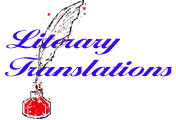
In the act of literary translation the soul of another culture becomes transparent, and the translator recreates the refined sensibilities of foreign countries and their people through the linguistic, musical, rhythmic, and visual possibilities of the new language. Literary translation bridges the delicate emotional connections between cultures and languages and furthers the understanding of human beings across national borders.
Translation of fiction is very difficult, but due to work of translators we can study works of ancient philosophers, myths and legends of ancient civilizations, heritage of the European culture, and also works of modern writers. Reading the works translated into Russian, the reader perceives it as if it is initially have been written in Russian, thanks to laborious and a hard work of translator which used all its talents for the translation of what the author initially bethought.
As a rule, literary translation is performed only by the best experts in the field of linguistics which are capable to adapt all the coloring from one language to another, and thus, without having lost art value of the work of literature. To reflect in fine fashion an event in work of literature, the translator should be well familiar with culture and country history, its mentality and the period which is described in a work of literature. Without such knowledge translator cannot get message of author’s idea across to the reader.
Except knowledge of a foreign language, the translator should know the native language in perfection and to be the master of an epistolary genre. Often translations are performed by different writers and though, they are not freely speak foreign language, their translations turn out competent, beautiful and easy-to-read.
Specific complexity for literary translation is carried by the settled expressions, proverbs, phraseological units and idiomatic turns. In its works writers often use such technique, and without its knowledge translation is almost impossible. Many cases when literary translation lost true value of the written are known. It occurred that the translator approached to translation word-to-word. The most known mistakes while translating are the following expressions:
John the Baptist (Ioann Krestitel’) – translated as John Baptist
Saint Virgin (Svyataya Deva) – “Sacred Virginia” or “Sacred Virgin”
Literary translation has a great number of such expressions.
Besides, it is necessary to not forget also about slang expressions which too often occur in works of literature. Each country is a heritage of centuries, and has untranslatable folklore, as for example, speech of inhabitants of Odessa or Georgia.
Except knowledge of a foreign language, the translator should know the native language in perfection and to be the master of an epistolary genre. Often translations are performed by different writers and though, they are not freely speak foreign language, their translations turn out competent, beautiful and easy-to-read.
Specific complexity for literary translation is carried by the settled expressions, proverbs, phraseological units and idiomatic turns. In its works writers often use such technique, and without its knowledge translation is almost impossible. Many cases when literary translation lost true value of the written are known. It occurred that the translator approached to translation word-to-word. The most known mistakes while translating are the following expressions:
John the Baptist (Ioann Krestitel’) – translated as John Baptist
Saint Virgin (Svyataya Deva) – “Sacred Virginia” or “Sacred Virgin”
Literary translation has a great number of such expressions.
Besides, it is necessary to not forget also about slang expressions which too often occur in works of literature. Each country is a heritage of centuries, and has untranslatable folklore, as for example, speech of inhabitants of Odessa or Georgia.



